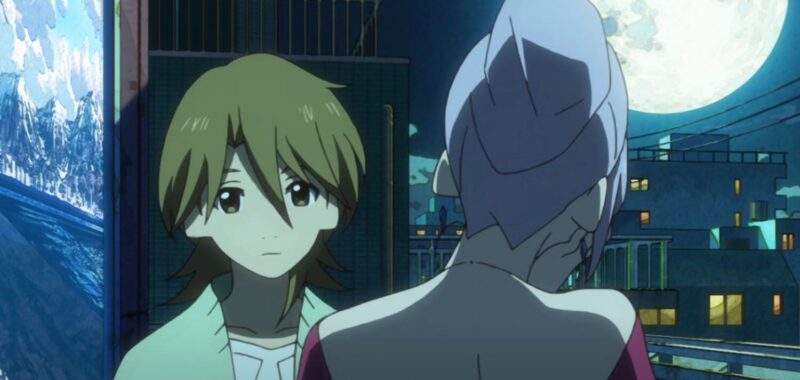Note: This article pertains only to the first season of the series.
Somewhere on a Kyoto rooftop, a beautiful young woman and a charming young man share a cocktail by moonlight. The young man, Yasaburō Shimogamo, asks his companion what is making her so sad. The woman, Benten, answers, “You, my dear, because one day you will be eaten by me. But if you eat the thing you love, it will be gone forever.” To this, Yasaburō remarks, “Have you considered not eating me?”
Benten is being literal, and Yasaburō is only half-joking. This would be no act of cannibalism. She is mostly human, but Yasaburō is actually a tanuki, a small raccoon-like mammal that has often been attributed magical shapeshifting powers in Japanese folklore. Most people might consider spending less time with a woman who plans to one day devour them, but Yasaburō? Yasaburō is a middle child.
The third of four errant tanuki brothers who have fallen into disrepute after the sudden demise of their father, Yasaburō wants nothing more than to live an interesting life. Elders bemoan his lack of ambition and wasted talents, but Yasaburō shrugs it off, more preoccupied with juggling his siblings’ myriad problems than with making something of himself, stirring up trouble and avoiding stewpots by the skin of his teeth. Yasaburō is certainly not joking, but he is also little amused on that moonlit rooftop, when he tells Benten, “Well, you can’t have your tanuki and eat it too.”
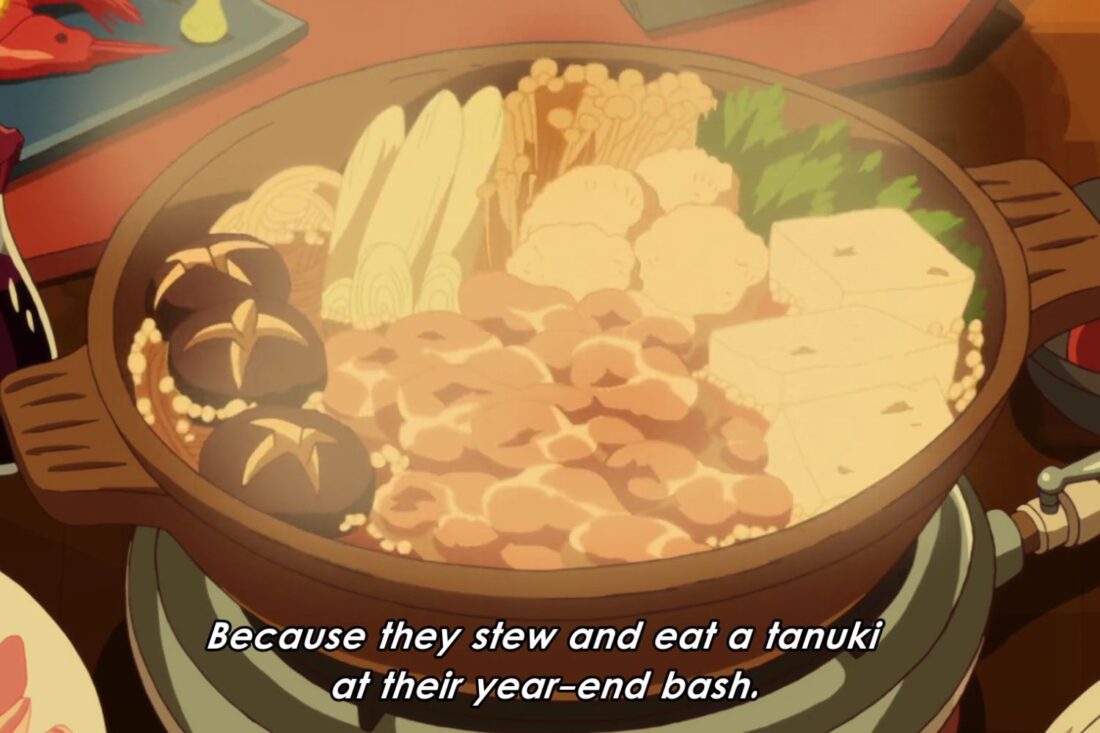
That’s an idiom we’re all familiar with, albeit usually with cake, but in the case of The Eccentric Family, the audience gets everything they want and more. When it comes to magical realism, reflecting on the roles we play at home and in the world, no show succeeds quite like this one. Written by Tomihiko Morimi and produced by oft-underrated animation studio P.A. Works, this remarkable tale of magical creatures living in unspoken harmony in Japan’s cultural capital is, at its heart, an homage to the joys and perils of siblinghood, as well as a thoughtful meditation on the transformative nature of grief.
The Farewell We Bid Our Great Father
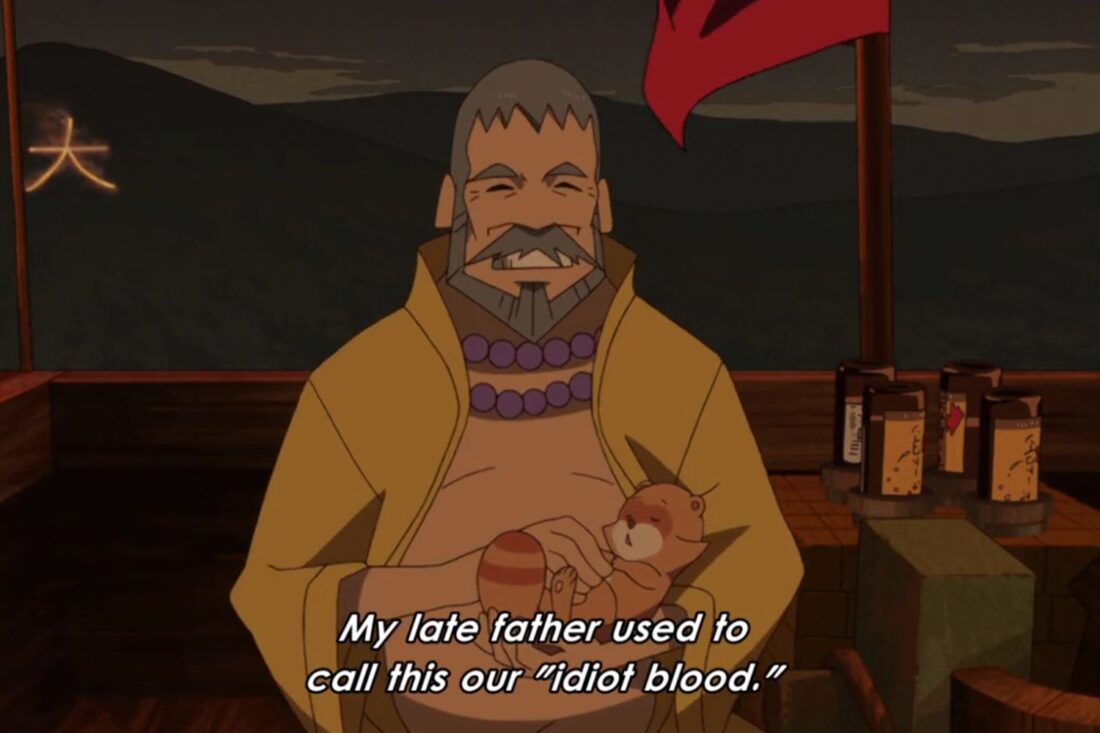
A few years before our story commences, Sōichirō Shimogamo, the elected leader of Kyoto’s tanuki society, is made into a stew and eaten by a prestigious society of humans as part of a bōnenkai, a traditional New Year’s party. Yasaburō and his brothers say farewell to their father in the morning, never considering he might never come home.
Sōichirō Shimogamo feels immortal, a local legend who’s respected by tanuki and even by tengu, the flying yōkai that rule Kyoto’s skies (tanuki keep to the earth, and humans run the city). Sōichirō keeps the various tanuki families in check and once defended Kyoto from invaders by transforming into an entire mountain to scare them off. What kid would not look up to a dad like that?
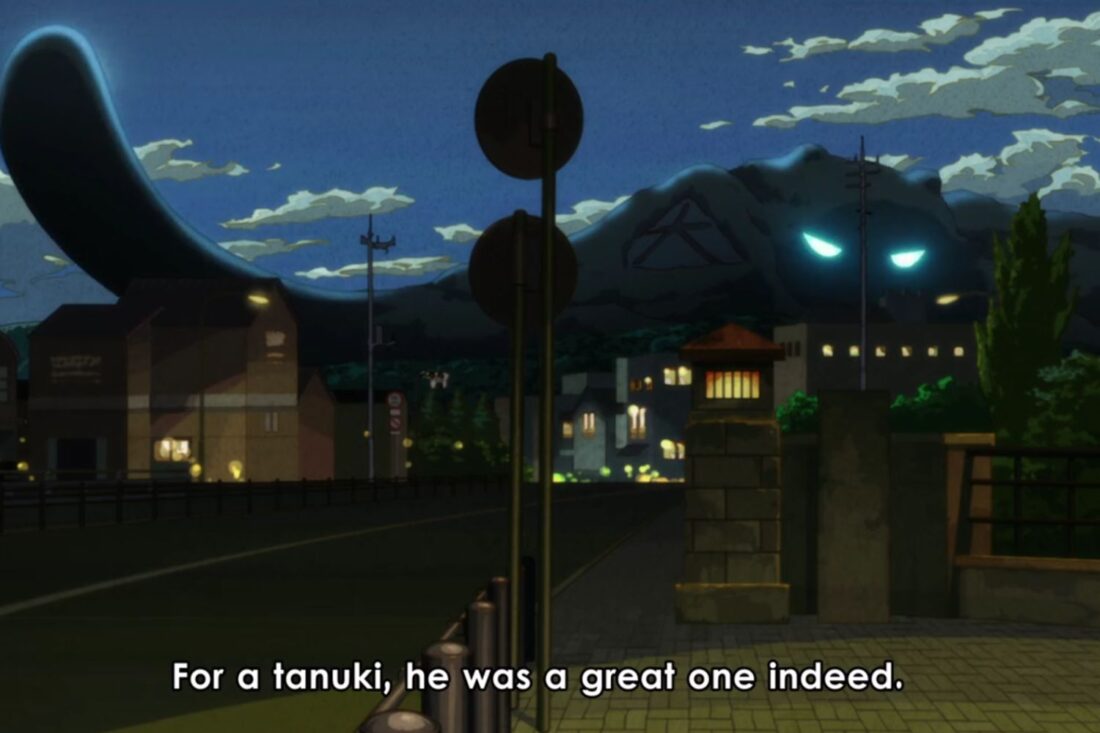
But to be a tanuki is to be mischievous, and Sōichirō is subject to the whims of what he calls his “idiot blood.” When he is captured, his fate sealed, he remains unafraid. He has accomplished all he wanted to in life, and for a tanuki, being cooked in a stew is not an unheard of death.
Never once do the other tanuki in the story acknowledge what the audience feels: Wait, but it’s wrong to eat a sentient creature! If human beings knew the truth about tanuki, they would never! As in most stories that fall under the general umbrella of magical realism, exactly how much humans know about mythical creatures in their midst is a little unclear, and besides, a creature being intelligent has rarely stopped humans from enjoying their established perch at the top of the food chain. For a tanuki, death by human is almost natural.
But when Sōichirō goes gently into that hot stew, his family is devastated, as is the audience. Tanuki, by nature, are supposed to be content with an aimless, enjoyable life rife with mischief, but family has always been the beating heart of the Shimogamos’ joy. Can carefree, happy abandonment truly be achieved in the shadow of grief?
The Eldest: Only His Sense of Responsibility
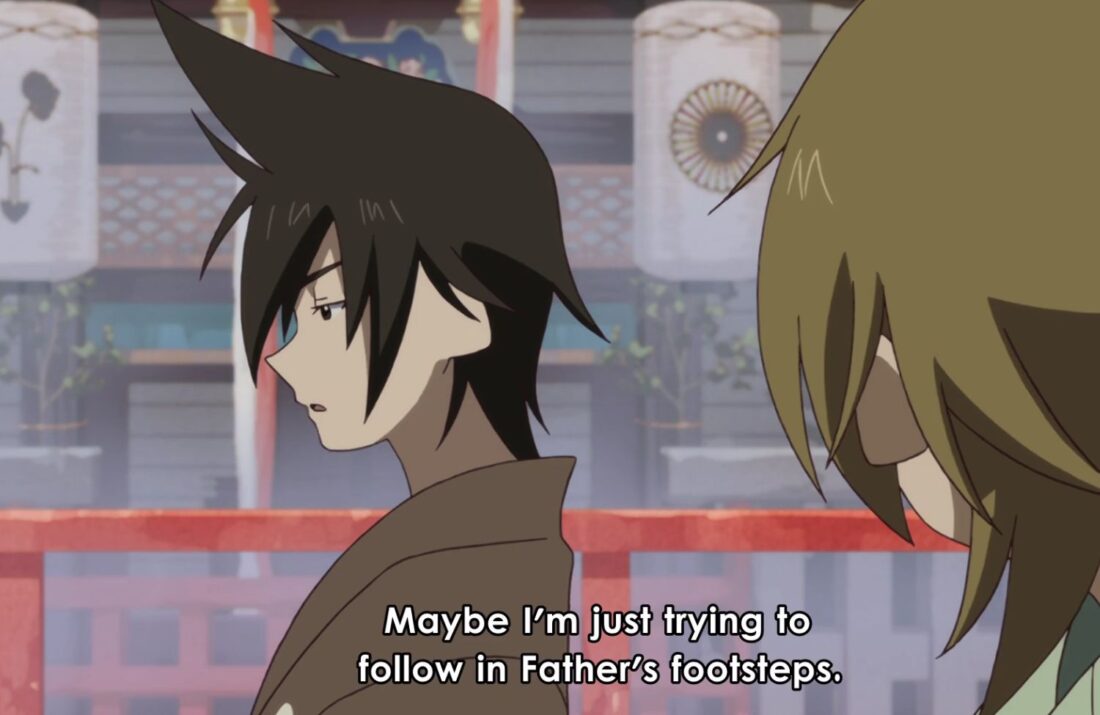
The eldest of the Shimogamo sons, Yaichirō is preparing for an election, determined to become the leader of tanuki society. It has been a seat vacant since his father’s demise, and he feels the best way to honor Sōichirō is to take on that role. But Yaichirō, like many eldest siblings, has never truly considered the difference between what is expected of him and what he actually wants.
Anxious beyond belief, prone to falling into hysterics under pressure and transforming into a tiger the instant anyone insults his family or their honor, at first it seems clear that Yaichirō is not the best choice for a leader. Then again, tanuki are supposed to be reckless, whimsical creatures. As the series progresses it becomes apparent that, despite Yaichirōu’s faults, he is moral and well-intentioned. At times, his brothers feel like another burden Yaichirōu must bear; as his brother Yajirō observes: “Poor Yaichirō. He’s trying so hard, but his brothers are a frog, an idiot, and a kid.”
But actually, his brothers make him better. A leader is never one person, but also the people he or she goes to when things get tough. Despite the weight on his shoulders, Yaichirō gradually learns to ask his family for help. In this way he does take after his father and perhaps even surpasses him; if Sōichirō had asked for help sooner, he may not have lost his life.
The Second Eldest: Only His Easy-going Personality
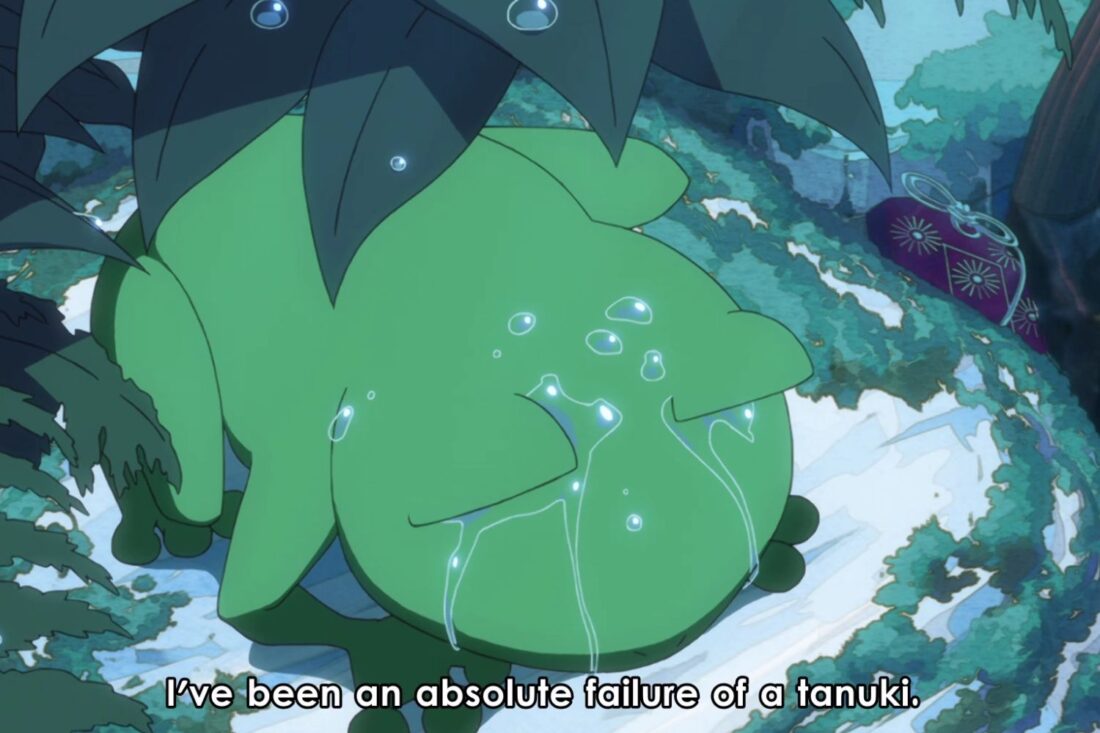
Arguably, among the Shimogamo kids, it is Yajirō, the second-eldest, who takes Sōichirō’s death the hardest. Forever described as the laziest of all tanuki, Yajirō has often been a self-fulfilling prophecy, living down to those expectations. Even before his father’s death, Yajirō saw himself as a failure and a drunk. Having gone drinking with his father on the night of the doomed bōnenkai, Yajirō feels uniquely responsible for Sōichirō’s capture and death.
Unable to face his mother, he adopts the shape of a frog and takes up residence in the bottom of a wishing well. Soon he is unable to transform back into his tanuki form, let alone any other shape, and I swear to hell I have never seen any show encapsulate the insidious spread of deep depression as effectively as this gloomy frog in a well.
For all that Yajirō views himself so negatively, he does not come across as lazy to others. Instead, he achieves a strange sort of wisdom from being a frog in the well, listening to the woes and wishes of all those who toss a coin in his waters. Often Yajirō’s observations lead to revelations and successful rescues. It is Yajirō who can be objective about his siblings and their troubles. He gives each of them advice in turn, and foretells disasters before they happen.
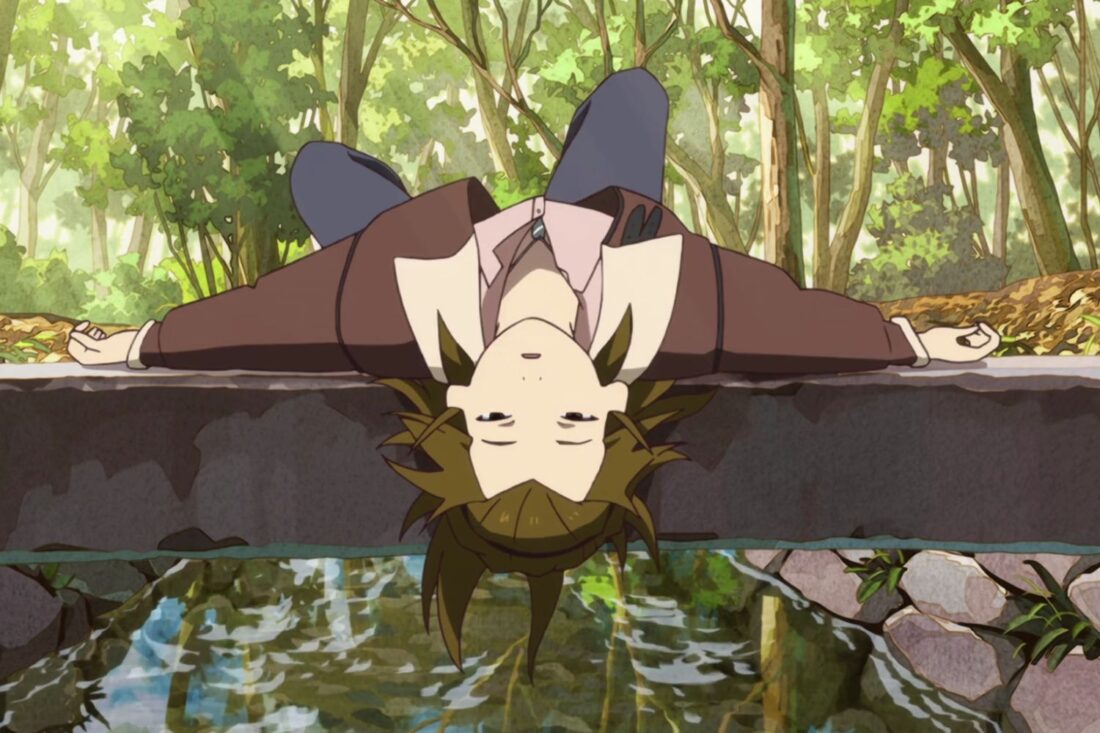
“What do I know,” he says, time and again, right after doling out another stunning piece of wisdom. “I’m just a frog in a well.” Well, it turns out frogs in wells know a great deal, though they’re the last to appreciate themselves. When at last Yajirō learns to see himself as objectively as he sees others, he’ll be free of that hole he’s dug for himself.
Relatable? Yes, very much so.
The Third Son: Only His Idiocy
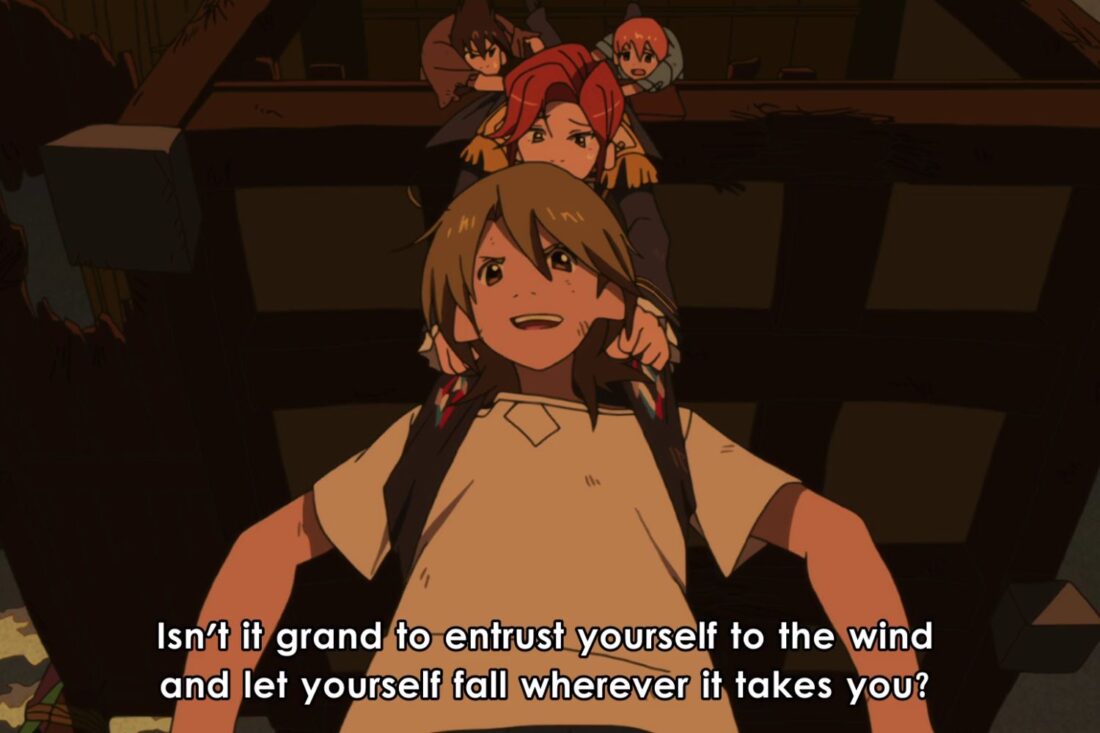
Yasaburō is the series protagonist, and for good reason: Yasaburō embodies the tanuki ethos perfectly. He fears nothing so much as boredom, and though he claims he has “no intention of sticking my nose where it doesn’t belong,” others in the series frequently express genuine shock that he isn’t dead yet. Where Yasaburō goes, trouble seems to follow, after all. He’s described as an idiot because he always appears in the eye of every storm that hits Kyoto’s layered societies.
But appearances are, of course, deceiving, especially where adept shapeshifters like the third Shimogamo son is concerned. In truth, Yasaburō is rarely the cause of the trouble; instead, he is often trying to resolve the troubles of others, and gets caught up in the mess along the way.
Yasaburō is altruistic to a fault, unable to leave even mere acquaintances alone in their sadness. His talent for getting into messes is actually a talent for haphazard problem-solving. Yasaburō is the only tanuki willing to care for a crotchety old tengu who’s lost his ability to fly; he’s the only tanuki who directly challenges a rival tanuki family when they become abusive; the only tanuki who holds a torch for the human woman who literally ate his dad for fun. And when Yasaburō is forced to perform for the Friday Fellows, the very human society that cooked his father, he befriends one of the group members, a professor who happens to be a passionate gourmand. The professor tells him, “I love tanuki, and to eat is to love!” Yasaburō can’t bring himself to hate the guy.
More than anything else, Yasaburō fundamentally understands what it means to be a good tanuki as well as a good brother. He is honest but not unkind, rarely angry, and never bored. He is not expected to lead and he is not babied like the youngest son, Yashirō; he is only ever himself, even as he dons a thousand other faces. A testament to the unsung plight of middle children, who often keep entire families afloat, Yasaburō is the red, beating heart of this affecting fable.
Our Mother’s Love, As Deep As The Sea
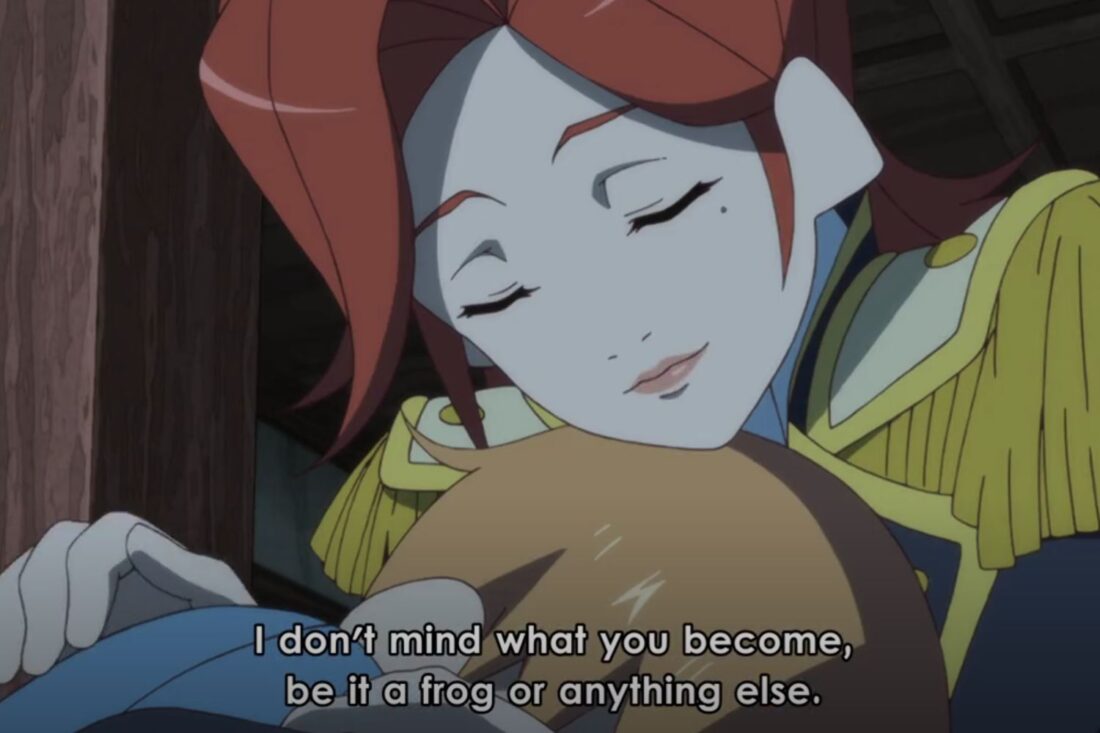
Traditional roles for women are as fraught in Japan as they are anywhere else, with any number of nuances that need to be accounted for. There’s no denying that in many ways, Tōsen Shimogamo is a traditional anime housewife and matriarch. She demonstrates unfailing love for her children.
When her sons come home distressed after a terrible revelation about their father, she holds them all close and tells them, “I don’t mind what you become, be it a frog or anything else. As long as you exist in this world.”
I cannot be the only queer kid who tears up at this scene every time, can I? The message is strengthened by Tōsen’s own depth of character, subtle but undeniable. Yes, she is a mother, but like all real mothers, she is also many other things.
She once befriended a human being, just as Yasaburō does later on; after her husband’s demise she remains resilient and retains her love for mundane life. Tōsen Shimogamo has become a local billiards legend, wearing a military uniform to the billiards hall where she is referred to as “the Black Prince.” And, as the series progresses, we learn a little about the life she lived before she became a mother. She is kind and tough and playful but also deeply afraid of thunderstorms, a person with an identity beyond the role she has been cast into. In this way, she is the perfect example for her sons, who will learn to be more than the roles society has assigned to them. And all of this really does make her love feel as deep as the sea.
As Yasaburō observes, in a touching moment at the shrine after dark, “Our father was an amazing tanuki […] but you know, so is our mother.”
Regarding Benten
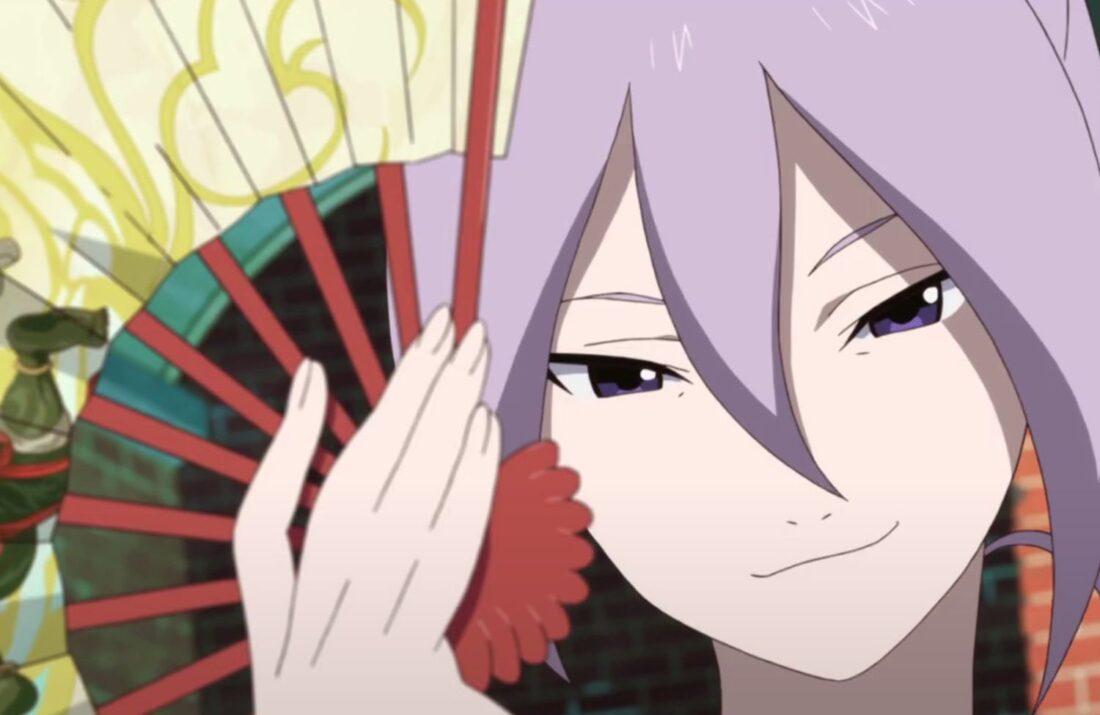
The Eccentric Family features a wonderful cast of characters beyond the Shimogamos, but that’s a conversation for another time. However, it is impossible to discuss this series without giving the deuteragonist her due.
If anyone feels truly displaced in this trifold society of humans, tengu, and tanuki, it’s the woman currently known as Benten. Born human but raised by a tengu, Benten has learned two things well over the course of her singular life; the first is how to fly, and the second is how to feel superior to others.
Benten is involved in all the major goings-on in Kyoto’s hidden societies, and yet remains an outsider at all of them. She can no longer live comfortably among human beings, given all she knows, but she is also looked down upon by most tengu and can’t help but feel disdainful of tanuki, despite her blatant affection for Yasaburō.
At first, her betrayal of Yasaburō’s family—his father’s capture and death is a direct result of her involvement with the Friday Fellows—would seem to cast her as the story’s true villain. And while sometimes this is undeniable, at other times Benten adopts a different role entirely, saving Yasaburō and his siblings when the mood takes her. More than anything, she seems to appreciate the tanuki for their entertainment value, and secretly, perhaps, envies their familial ties.
Bentent is always smirking, except when she is crying.
It is difficult to think of any character as contradictory as Benten, but the reasons for her apathy become apparent over time. In a single scene, we learn that Benten was not adopted by a tengu. Instead, she was kidnapped, stolen from a loving home along Lake Biwa, denied a family and a normal childhood through no choice of her own, due to the whims of a creature she probably saw as a monster.
Is it any wonder that she grows up resenting magical creatures? That when she becomes a young adult, she joins a human supper club in an attempt to find human companionship and also, possibly, wreak revenge on the magical worlds around her?
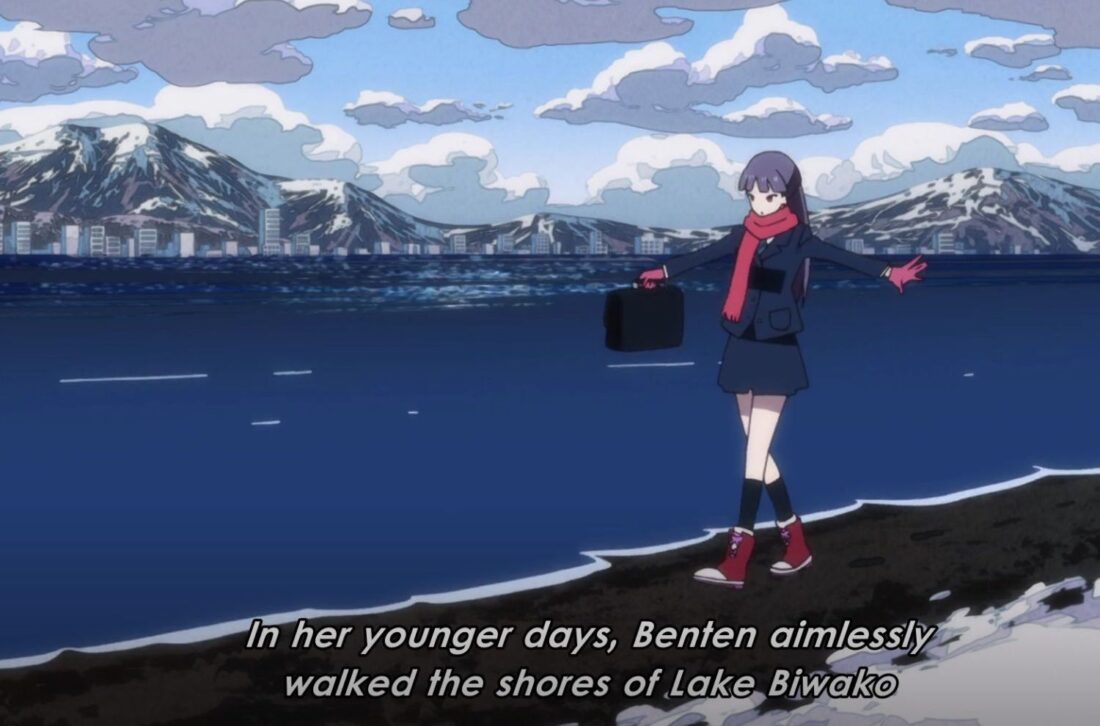
In one of the most poignant moments in the series, Yasaburō is visiting Yajirō in the well when Benten appears above them. She is crying wordlessly into the water. Yajirō says, “She does this sometimes.” When Yasaburō asks why, he answers, “Children don’t need a reason to cry; they just do.”
The acknowledgement is profound. Benten lost more than her childhood. She has lost her humanity, figuratively and literally, and will likely never regain any of it. It was not her choice to be spirited away. She lacks the one thing that’s most precious in the series.
Perhaps that’s why Yasaburō, kind to the point of recklessness, can’t abandon her, not even if she’ll one day eat him up, she loves him so.
The Family, Not-So-Eccentric
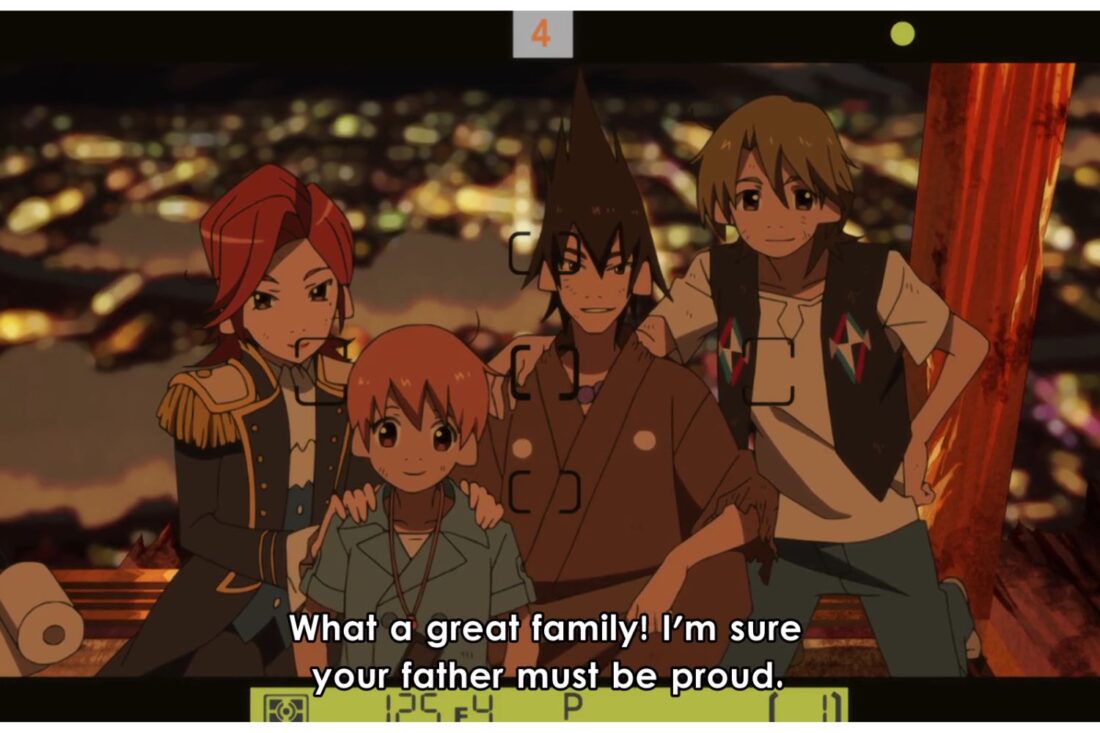
The Eccentric Family uniquely encapsulates how family roles form the crux of our identities. People say that grief is transformative, but for creatures who transform constantly by nature, it might be doubly so.
How does a family forge a new identity after the passing of a parent? This is a question most of us will have to answer at some point in life, and depending on who raised you, the question becomes more complicated. One of the central highlights of The Eccentric Family is that it never deifies its characters; every character in this show is flawed, and the Shimogamo fall prey to self-defeat and sadness. But it is through appreciating one another that they find not just a sense of place in a changed world, but also real, true happiness. Tanuki are resilient creatures, and Yasaburō is very good at reminding his brothers that life exists primarily to be enjoyed.
As Sōichirō told his second son, the night of his death, “What’s fun is good.” Of all the lessons he attempted to teach his boys, this is the one they have finally taken to heart, and I can think of a thousand more foolish ways to live.
If there’s any one anime series I could recommend to anyone, it’s this one, so I dare newcomers to give it a gander! The Eccentric Family is as underrated and brilliant as anime come. Next time I’ll be diving into Delicious in Dungeon, and then I hope to do a piece on ’90s anime space westerns. Cowboy Bebop and Trigun are shoo-ins, and Outlaw Star may get a brief mention. If you know any other series that fit the bill, please leave a suggestion in the comments!
In this article:
Up Next:

